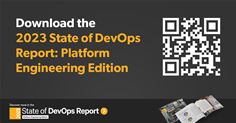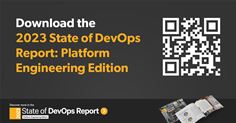2023 State of DevOps Report Finds Platform Engineering Unlocks DevOps Success in the Enterprise
The platform team is on the rise, with 51% of respondents reporting adoption within last three years
Portland, OR., USA – January 18, 2023 – Puppet by Perforce, the industry standard for infrastructure automation, today announced the findings of the global 2023 State of DevOps Report: Platform Engineering Edition. This year’s research explores the rising popularity of platform engineering and its benefits, with 93% of respondents reporting that platform team adoption is a step in the right direction.

2023 State of DevOps Report: Platform Engineering Edition
Last year’s State of DevOps report revealed that a platform team approach is an increasingly successful path to DevOps success at scale. This year’s report investigates the topic in more detail and discovered that an overwhelming majority (94%) agree that the concept is helping their firms better realize the benefits of DevOps. Platform engineering is the discipline of designing and building self-service capabilities to minimize cognitive load for developers and to enable fast-flow software delivery. Platform teams deliver shared infrastructure platforms to internal users responsible for delivering a value stream – typically software developers and engineers who treat their platform as a product for their users, not just an IT project.
“The findings show that platform engineering can produce meaningful benefits across an entire organization and unlock DevOps success for the enterprise. However, leadership must continuously invest in the platform team, ensure functional feedback loops with users, and evolve product management skills in the team, to ensure fast flow delivery and an ongoing reduction in cognitive load for developers,” said Nigel Kersten, CTO, Puppet by Perforce, and co-author of the State of DevOps Report. “As firms beef up hiring for platform teams, they must prioritize product management skills, not just core engineering.”
Key findings include:
When done well, platform engineering enables technical and business benefits that ripple across an organization.
- Respondents are most likely (30%) to state that platform engineering best serves the needs of the entire company – not just a single department.
- The majority (68%) of respondents are experiencing an increase in development velocity, with 42% reporting that speed of development has improved “a great deal.”
- The majority of respondents are experiencing a wide variety of benefits, ranging from improvements in system reliability (60%) to greater productivity/efficiency (59%) to better workflow standards (57%).
Hiring is on the rise, but don’t forget to focus on the product management skills.
- Organizations are looking to invest in additional talent. 71% of respondents report their firm plans to hire people with platform engineering experience over the next 12 months, with the majority (53%) planning to hire within the next 6 months.
- Respondents’ top priorities for the platform team are in line with product management responsibilities, including increasing awareness of platform capabilities (47%), setting realistic expectations for the platform team’s role across the organization (44%), and more closely following industry trends and keeping up with feature requirements (37%).
- However, firms are more likely to be focusing on other roles aside from product management. Indeed, 48% of roles fall under “DevOps,” followed by 45% software engineers, and 44% platform engineers.
Asia Pacific Region Most Upbeat About Platform Engineering – Compared to EMEA and the Americas
- Respondents from Asia Pacific are the most upbeat about platform engineering, with 86% reporting that their platform team is at or close to optimal performance – compared to 64% in EMEA and 73% in the Americas.
- More respondents in Asia Pacific believe that platform engineering is helping their organizations realize the benefits of DevOps, with 44% in “strong” agreement compared with smaller shares of 34% in EMEA and 32% in the Americas.
“Over the last few years of our DevOps research, a clear pattern emerged: enterprises with more mature DevOps practices tend to use platform teams,” said Ronan Keenan, Research Director, Puppet by Perforce, and co-author of the State of DevOps Report. “This doesn’t mean you must adopt a platform team model to be good at DevOps; rather, it’s that a platform team is a well-defined and proven path to succeed with DevOps at scale. This survey’s deep dive into platform engineering has enabled our team to better understand this rising trend.”
Supporting Quotes
“Platform teams are still struggling with educating their organizations about their platform’s capabilities and driving adoption. That’s where the platform engineering community can step up and share resources, knowledge, and best practices,” said Kaspar von Grünberg, Founder and CEO, Humanitec. “Platform engineering is key to realizing the benefits of DevOps. One can’t replace the other – both are crucial to the success of modern engineering organizations. Platform engineering experience is in high demand, and that’s why the community has grown by 800% in 2022 alone.”
“Platform engineering’s positive impact on system reliability, developer productivity, and delivery speed indicate that platform engineering won’t just be a trend. It is here to stay,” said Aeris Stewart, Community Management, Humanitec. “Platform engineering is an opportunity for engineering organizations to realize the benefits of DevOps at scale and without additional cognitive load on developers. An engineering organization’s culture continues to be a critical component of the platform team’s success. Strong communication around developers’ needs, the platform’s features, and the platform team’s role in meeting business objectives is essential.”
“The emergence of Platform engineering is a topic we’ve been following with multiple teams and organizations through our Women in DevOps community,” said Sabrina Battiston, Community Lead, Women in DevOps “We are looking forward to following the trends discussed in this report, specifically around how Platform teams are taking ownership of DevOps practices and enabling development teams – and reporting the findings back to our community who can then take to their respective organizations.”
Download the State of DevOps Report: Platform Engineering Edition for free.
Report Methodology
The survey collected data from IT practitioners and leaders who work with or are part of their company’s platform engineering teams, as well as from a control group of similar participants who do not have platform teams at their organizations for comparison. The survey was conducted online from September 14th to October 25th, 2022, and respondents were gathered through two avenues, a snowball sampling method and a professional panel.
The report was sponsored by the Continuous Delivery Foundation, Humanitec, and Women in DevOps.
Editor’s Note: A Deeper Explanation around the Platform Engineering Approach
There are several core attributes of a modern platform engineering approach. The most overarching one is having a product mindset, by which we mean that your platform is treated as a set of self-service products that continuously evolve to meet developer needs. The platform aims to reduce developer cognitive load and enables fast-flow software delivery, where the teams responsible for building value streams can deliver value to their consumers without requiring direct interaction with other teams.
For IT platforms, this approach begins with delivering underlying infrastructure services as a self-service product that are consumed by developer (or “value stream”) teams. The design and evolution of the platform should be informed by collaborative organizational learning practices, and the usage of the platform internally should be driven by internal evangelism, not via a top-down mandate.
All of this means that your platform team needs to have development, operations, product management, and product marketing skills, no matter the actual job titles within the team. A significant mindset shift for many enterprises is that while the platform team must have IT operations expertise, they do not operate the applications on the platform itself. They are responsible for delivering a reliable and resilient platform that empowers value stream teams to build, release, and operate their own applications.
Additional Resources
About Puppet by Perforce
Puppet by Perforce empowers people to innovate through infrastructure automation. For more than a dozen years, Puppet has led the way in IT infrastructure automation to simplify complexity for the masses in order to strengthen customers’ security posture, compliance standards, and business resiliency beyond the data center to the cloud. More than 40,000 organizations — including more than 80 percent of the Global 5000 — have benefited from Puppet’s open source and commercial solutions. In 2022, Puppet was acquired by Perforce Software. Learn more at puppet.com.
Media Contacts
PERFORCE U.S.
Grace Bonacum
PAN Communications
Ph: +1 510 502 6208
perforce@pancomm.com
PERFORCE UK/EMEA
Maxine Ambrose
Ambrose Communications
Ph: +44 118 328 0180
perforcepr@ambrosecomms.com



